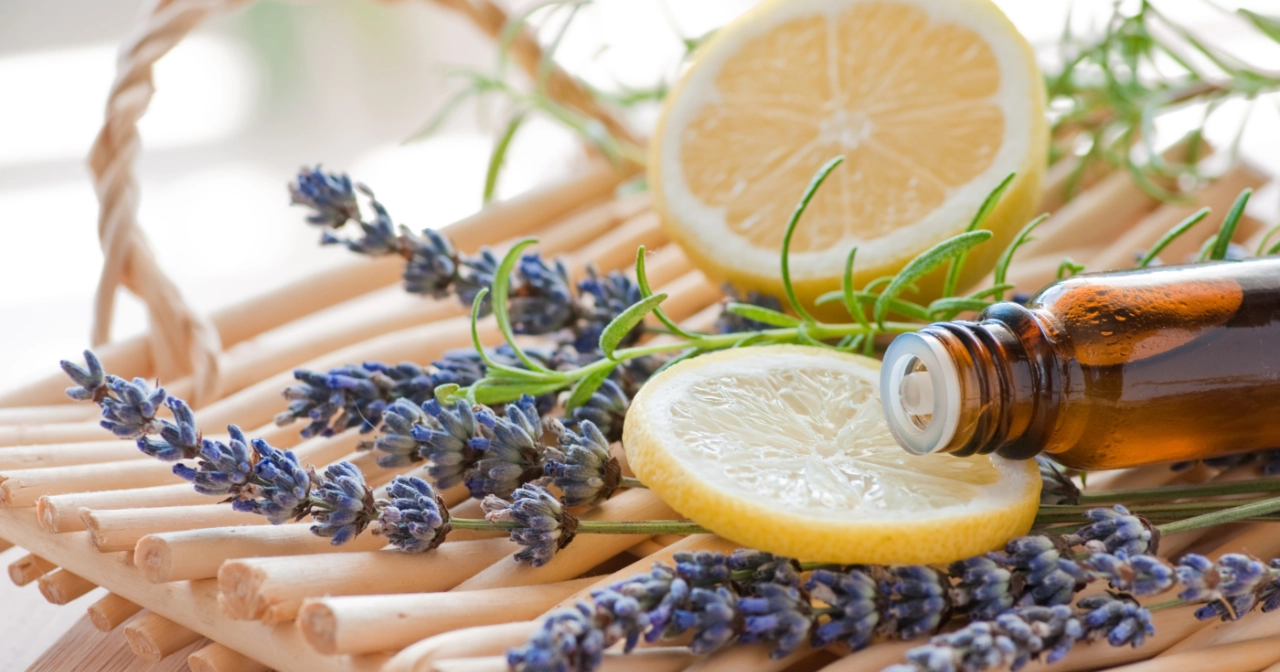Listen on: Apple Podcasts | Spotify
As I was browsing new health and fitness research papers, I came across a review in Frontiers in Pharmacology, titled Inhalation Aromatherapy via Brain-Targeted Nasal Delivery: Natural Volatiles of Essential Oils on Mood Disorders.
Though I enjoy reading full papers like this, I realize that many people don’t have the time or interest to read the whole thing, but would appreciate a simple summary outlining how essential oils and certain supplements may alleviate feelings of depression, anxiety, or difficulty sleeping.
As a long-time fitness professional, I understand well how one’s mood affects their willingness to make good nutrition and lifestyle decisions and to stay consistent with a good exercise program.
Anything that supports your mood without causing adverse side effects will help you make healthier choices. Unfortunately, only a small percentage of fitness professionals understand the value of mood-supporting supplements and essential oils, and so their clients miss out on them.
As it relates to essential oils, the paper’s authors stated:
In recent years, use of natural aromatherapy as adjuvant therapy for mental disorders, especially anxiety and depression has increased steadily, and increasing research is being done on the treatment mechanism . And furthermore, it has been proven to produce pharmacological effects via the use of high-quality essential oils entering the body by the nasal inhalation (through the respiratory system or olfactory nerves), through topical absorption (skin), or through oral administration (digestive system).
I’ll summarize the findings and weave in my own thoughts and practical applications throughout the post.
Mood Disorders: Dealing with the Cause Versus the Symptom
Mood disorders arise from a variety of issues:
- chronic stress (physical or mental)
- medication side effects
- nerve injury
- neurotransmitter imbalance
- organ damage
- psychological disorders
- trauma
The past couple of years has caused significant financial, professional, and social stress, and it doesn’t seem to be getting better anytime soon. So, we should expect rates of depression, anxiety, and sleep debt to keep rising. At least, until the public elects an administration with a smidgen of common sense.
I should also point out that excessive physical stress can cause anxiety, depression, and sleep debt. If young athletes don’t eat enough high-quality food and get enough rest, they may unexpectedly succumb to mood disorders.
With all that said, supplements, essential oils, and even most medications don’t deal with the cause of a mood disorder.
Therefore, they don’t treat it. They simply help you manage the symptoms, which makes life much more enjoyable. It’s still crucial to root out the cause and deal with it.
Lavender
Not surprisingly, the authors covered lavender first. It’s the most studied and popular essential oil on the planet. Keep in mind, though, there’s still a significant difference between cheap lavender oil at a gas station or retail store, and high-quality, therapeutic lavender essential oil.
Linalool and linalyl acetate are the two most important constituents in lavender essential oil, though it contains dozens of others. Both compounds have been shown to reduce pain and activate the parasympathetic nervous system, helping you relax.
A 2021 systematic review found that lavender decreased feelings of anxiety and despair while other studies have shown it improves sleep quality. The improved sleep could be a result of reduced anxiety, or increased secretion of sleep-inducing neurotransmitters.
Personally, I didn’t like lavender that much when I first started using essential oils, though the scent did grow on me. Fortunately, there are plenty of other options if the scent of lavender isn’t your thing.
Read also: Lavender Essential Oil for Anxiety and Depression.
Roman Chamomile
Roman Chamomile has been used in Egypt, Greece, and Rome for thousands of years. Like lavender, traditional medicine practitioners have used it for a large variety of ailments.
In a 2021 study , researchers divided 183 people into a lavender group, a chamomile group, and a control group. The lavender and chamomile groups inhaled 3 drops of a 1.5% concentration of their assigned essential oil for 30 nights. At the end of the study, the researchers concluded:
Inhalation aromatherapy with both lavender and chamomile essential oils helped decrease depression, anxiety, and stress levels in community-dwelling older adults.
Ebrahimi H, et al.
Being that the results were similar for both the lavender and chamomile groups, you could likely use either one for a similar benefit, and make your choice based on which scent you prefer.
Bergamot
Bergamot offers numerous health benefits, which vary based on whether you use it internally, topically, or aromatically. I covered bergamot in an article of its own here: Bergamot Essential Oil: Health Benefits, Uses, and Precautions.
As I explained, one study discovered:
Listening to soft music and inhaling Citrus bergamia essential oil was found to be an effective method of relaxation, as indicated by a shift of the autonomic balance toward parasympathetic activity in young healthy individuals.
Peng SM, et al.
Another study concluded:
In the present study BEO was inhaled together with water vapor through the nose into the alveoli, inducing mental and physical effects by inhalation alone. It can therefore be used as a relatively simple form of stress reduction, which might be useful in our modern society plagued by chronic stress.
Watanabe E, et al.
In that study, the researchers showed that inhalation of the oils supported a normal heart rhythm, cortisol levels, and mood while reducing feelings of fatigue.
Melissa (Lemon Balm)
In 2021, researchers published a meta-analysis (analysis of all high-quality research studies available) on Melissa officinalis.
They concluded:
Current evidence suggests that lemon balm may be effective in improving anxiety and depressive symptoms, particularly in the acute setting.
Ghazizadeh J, et al.
To reiterate from my introduction, we’re talking about “improving symptoms,” not treating a condition. Of course, if symptoms improve, people may be more willing to take action to improve the cause of the condition in the first place.
Read also: Which essential oils help with headaches?
Other Mood-Supporting Essential Oils
Though the authors of the review I mentioned at the beginning didn’t cover them, I wanted to note a few other essential oils with research-backed mood-supporting benefits.
That’s not to say there aren’t more. There are literally thousands of plants that produce essential oils, so I’m no doubt missing some that support mood and sleep here.
Mood-Supporting Supplements
Surprisingly, in the paper Inhalation Aromatherapy via Brain-Targeted Nasal Delivery: Natural Volatiles or Essential Oils on Mood Disorders, the authors only covered two supplements that offer mood support: Saint John’s Wort and Rhodiola Rosea.
My assumption is that they didn’t have the time or space to cover more, because there are a lot more, including:
- N-Acetylecysteine (NAC)
- Creatine Monohydrate
- Magnesium
- Relora
- Probiotics
- Fish Oil
- CBD or Hemp Oil
- Theanine
- GABA
- 5-HTP
Conclusion
The study opened their conclusion with the following:
In summary, inhalation aromatherapy via brain-targeted nasal delivery can be an effective option for improving depression, anxiety, and sleep disorders. When used in inhalation aromatherapy, the advantages of essential oils are high permeability, fast metabolism, non-retention, and low toxicity.
Cui J, et al.
Essential oils can play a significant role in supporting a normal mood and good quality sleep. So can a number of nutritional supplements. The best part is that they do so without any or with minimal adverse effects. That’s quite different from many pharmaceutical options.

Feel Better Fast. Guaranteed.
Energy+, EDGE, and MentaBiotics make up the Happy Juice supplement stack, with ingredients clinically proven to:
- decrease anxiousness scores by 55%
- decrease irritability scores by 60%
- decrease fatigue by 64%
- decrease anger 54%
- decrease tension by 45%
- decrease confusion by 43%
- decrease overall distress by 49%
- increase good bacteria by 70%
- decrease negative mood by 105%
- increase positive mood by 211%
References
Angelucci, F. L., et al. “Physiological Effect of Olfactory Stimuli Inhalation in Humans: An Overview.” International Journal of Cosmetic Science, vol. 36, no. 2, Apr. 2014, pp. 117–23. PubMed, https://doi.org/10.1111/ics.12096.
Ebrahimi, Hossein, et al. “The Effects of Lavender and Chamomile Essential Oil Inhalation Aromatherapy on Depression, Anxiety and Stress in Older Community-Dwelling People: A Randomized Controlled Trial.” EXPLORE, vol. 18, no. 3, May 2022, pp. 272–78. ScienceDirect, https://doi.org/10.1016/j.explore.2020.12.012.
Ghazizadeh, Javid, et al. “The Effects of Lemon Balm (Melissa Officinalis L.) on Depression and Anxiety in Clinical Trials: A Systematic Review and Meta-Analysis.” Phytotherapy Research: PTR, vol. 35, no. 12, Dec. 2021, pp. 6690–705. PubMed, https://doi.org/10.1002/ptr.7252.
Singh, Ompal, et al. “Chamomile (Matricaria Chamomilla L.): An Overview.” Pharmacognosy Reviews, vol. 5, no. 9, 2011, pp. 82–95. PubMed Central, https://doi.org/10.4103/0973-7847.79103.
Tai, Yuling, et al. “Analysis of Terpenoid Biosynthesis Pathways in German Chamomile (Matricaria Recutita) and Roman Chamomile (Chamaemelum Nobile) Based on Co-Expression Networks.” Genomics, vol. 112, no. 2, Mar. 2020, pp. 1055–64. ScienceDirect, https://doi.org/10.1016/j.ygeno.2019.10.023.
Zarzo, Manuel. “The Sense of Smell: Molecular Basis of Odorant Recognition.” Biological Reviews, vol. 82, no. 3, 2007, pp. 455–79. Wiley Online Library, https://doi.org/10.1111/j.1469-185X.2007.00019.x.



